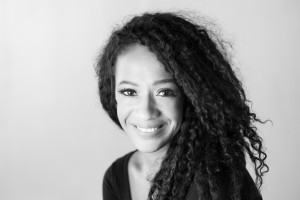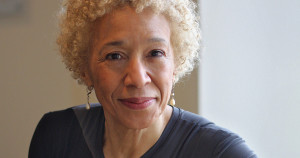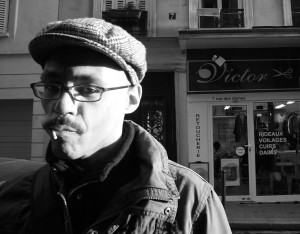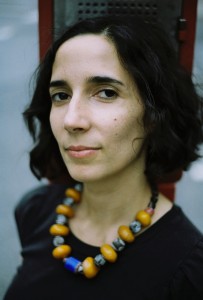FPP spoke with writer and world traveler Emily Raboteau about the “school-to-prison” pipeline, brudermensch, and freedom from context. Emily reads with us this Tuesday, November 10th, 7pm, at Shrine in Harlem.
In Searching for Zion, the Quest for Home in the African Diaspora, you track the experience of displacement handed down over hundreds of years to the descendants of African slaves. It’s a tremendous cultural, philosophical, and literary undertaking. It was also a personal quest, though, to address your own sense of unease in American culture, which routinely denies full humanity to many of its residents. Does the personal conclusion at the end of the book—that Zion is located within—hold for you today? Or has your central, driving question changed?
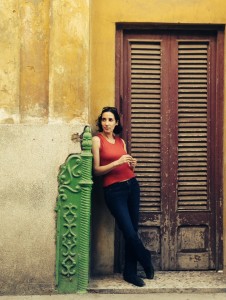 Thanks for calling the book a tremendous undertaking. (One might also call it a fool’s errand that I went looking for a geographical Zion.) Though I have to point out as one of my interview subjects did when I used the term “African slaves,” that we should really say, “enslaved Africans.” Let’s recall that this was not their identity, but a condition forced upon them. And I’d say I was, and am, motivated by disgust with U.S. government policy that systematically denies full humanity to a great deal of its citizens. I do still feel that the ultimate Zion lies within. As an outgrowth of that understanding, my driving question has changed. It’s no longer Where do I belong given that so much about this nation sucks ass? but What can I do to make this a less sucky place?
Thanks for calling the book a tremendous undertaking. (One might also call it a fool’s errand that I went looking for a geographical Zion.) Though I have to point out as one of my interview subjects did when I used the term “African slaves,” that we should really say, “enslaved Africans.” Let’s recall that this was not their identity, but a condition forced upon them. And I’d say I was, and am, motivated by disgust with U.S. government policy that systematically denies full humanity to a great deal of its citizens. I do still feel that the ultimate Zion lies within. As an outgrowth of that understanding, my driving question has changed. It’s no longer Where do I belong given that so much about this nation sucks ass? but What can I do to make this a less sucky place?
Where do you see the most urgent domestic (US) experiences of displacement today, perhaps even in your neighborhood? Those who are not at home where they live?
I live in Washington Heights, where gentrification is an issue that makes visible the city’s segregated school system. A couple years ago there was talk of de-zoning our district in an effort to equalize access to good schools, but it was put to bed by privileged and entitled parents who were scared their kids would lose their leg up. I see long-term residents in the hood being physically displaced through escalating rents and the greed of real estate developers. An even more urgent displacement is the school-to-prison pipeline trend wherein poor children, many of whom have learning disabilities or histories of abuse and would benefit from additional education and counseling services are instead isolated, punished, and funneled out of public school and into the juvenile and criminal justice systems via “zero-tolerance” policies that criminalize minor infractions of school rules and inordinately discriminate against kids of color.
Do you hope that your own children, growing up in Washington Heights, develop an attachment to New York as home, or would you rather bequeath to them your productive distance, so that they might locate Zion “within,” as you do for yourself at the end of the book?
Both. I want them to find something unwavering within themselves, even as they live on shaky ground. Some people might call that “faith.” Others would call it a “moral compass.” Lately, I prefer the term, brudermensch, which I learned from Bernard Malamud’s perfect short story, “The German Refugee.” But whatever you call it, the point of that quality is not distance. It’s social engagement. I know it’s a platitude, but we need to care for our neighbors. I also hope that as New Yorkers, my kids will know they’re citizens of the world. I can’t tell you how happy it made me to here my son declare, “I got eyes like ackee stone in my sheyne punim,” at the age of three.
Ta-Nehisi Coates said in a recent interview that moving to Paris allowed him a temporary break from daily burdens of race in America. When he experiences racist exchanges in Paris, he doesn’t feel the same sting because it isn’t his context. In your experience traveling the world, moving toward danger and complexity instead of away, did you experience freedom from context? If so, how, ultimately, have you come to feel about such freedom?
I did experience freedom from context through extended travel (even though my destinations were in the “third world”) and I felt very privileged because international travel is a luxury most people can’t afford. I also came to see that every country is unjust in its own particular, perverted way. Ta-Nehisi witnessed the same thing in Paris, just as Baldwin did before him, and Chester Himes, and Richard Wright—just because these black men didn’t feel the same sting abroad didn’t mean some other group wasn’t getting kicked in the teeth. William Gardner Smith, a lesser-known author than these cats, put it bluntly in his novel, The Stone Face: “The Algerians are the niggers of France.” That’s just it. Every nation has its “niggers.” In Jamaica, the niggers are the gays. The players might change but the struggle is more or less the same for people who don’t enjoy full freedom. Every nation-state is a work in progress. That was actually a liberating, if distressful, discovery. Sort of like the moment in therapy where you accept your abusive parent is flawed and start working on yourself so the family you’re building (and I mean “family” in the broadest human sense) is less fucked up than the one you grew up in.
Can you tell us a little bit about what you’re working on now? And in what ways this new work might be a continuation, refutation, or revision of your first two books?
Yes, I’m working on my second novel. It’s called Endurance and it’s about the Dominican superintendent of a gentrifying building in Washington Heights who must raise his autistic son to be a competent adult. It’s not as autobiographical as the first two works but does share many of the same themes—inequality, citizenship, and the question of belonging or not belonging to a community.

